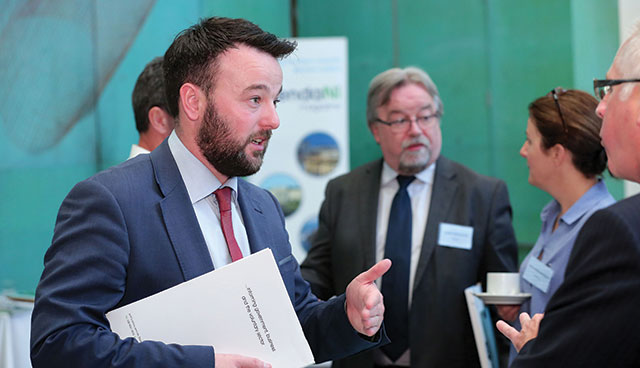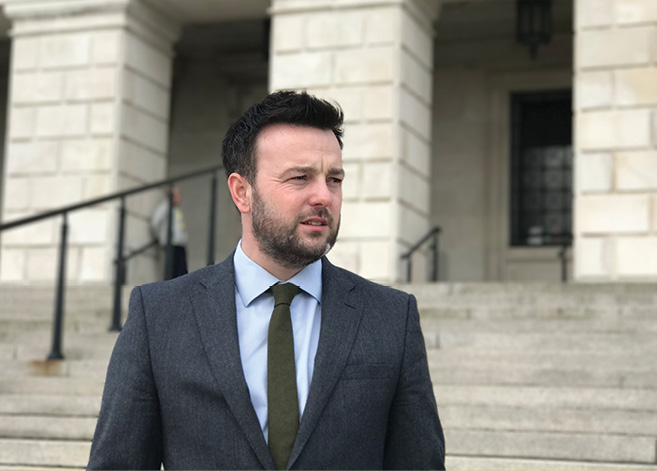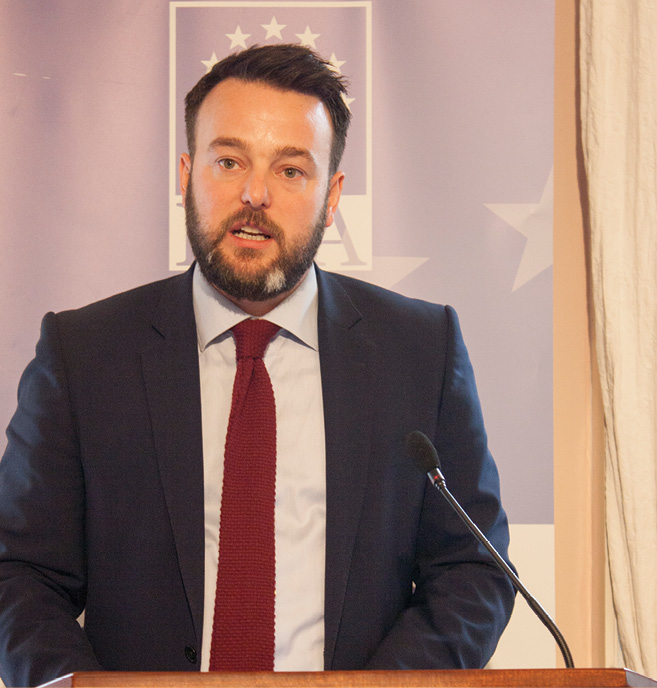Fresh opposition


SDLP leader Colum Eastwood talks about moving the party forward in opposition, Trump and Brexit with agendaNi’s David Whelan.
Much has changed in the political context of Northern Ireland since Colum Eastwood toppled Alasdair McDonnell for the party leadership in November 2015. In May 2016 the party recorded its worst ever performance during the Northern Ireland Assembly elections and the result prompted its move into the sphere of a formal opposition, a first for Northern Ireland. The era of a new Government format in Northern Ireland though has been somewhat overshadowed by more national events in the shape of Brexit and even more recently, international events, in the form of Donald Trump.
Shortly after the election of Trump was confirmed, Eastwood was quick to reaffirm his pre-election stance that he would boycott any White House event while the billionaire was in office. “What we saw with the election of Trump was a victory for a very right-wing, narrow-minded, closed down, protectionist view of the world. I think that’s bad for Northern Ireland and bad for Ireland in general,” he states. The Derry-native does however acknowledge that the snub is unlikely to make the President-elect lose any sleep. “This is a gesture from us,” he explains. “This is more than about economics. I don’t think being a racist and casting slurs upon different groups is okay and I think those of us who have any kind of a voice at all should use it. I completely and utterly respect the vote of the American people but I also feel an obligation to speak out and what we are talking about is not going to [the Whitehouse for] a champagne reception.”
Eastwood insists that the decision will not mean a cutting of ties with the United States. “We will still be very much engaged with America and I’ll be personally in Washington around that time (St Patrick’s Day) meeting with people from both parties with whom we have relationships. However, I do feel we need to get away from this idea that the only thing we go to America for is to get our back slapped. That’s getting old and I think there is an addiction from some politicians to going over to Washington to be told how fantastic they are.”
Opposition
In contrast Mike Nesbitt, the leader of the UUP and the SDLP’s partner in Opposition, was quick to congratulate Donald Trump on his victory. Explaining that the pair had not discussed it, Eastwood says: “My position on Donald Trump is my own and not a position that needs to be agreed by anyone else.” Disagreement on certain issues is to be expected, he contends: “I don’t think there is any other opposition in the world that has as close a relationship as we have. However, it is not expected of oppositions to agree on everything and what we will do, and what we have already done, is agree on opposition day motions, amendments and continue to work closer together as we move forward.”
Describing his decision to lead the SDLP into Opposition, rather than take up their place in the power-sharing Executive, Eastwood said he believed the old system was not delivering. “I think people are fed up with the constant negotiations, fallouts and crises. They want delivery and all too often we have seen deflection and distraction from the main two parties. Opposition is there to hold the Government to account and to ensure delivery of promises, but also to provide answers and alternatives in a constructive format.”
When working within the system, his party’s influence was limited, he argues. “We were in the Executive for nine years with one minister and all the business was done outside of the Executive. We had good ideas which others took credit for and when we opposed ideas, we weren’t listened to.”
Asked whether the party’s switch had strengthened the relationship between the DUP and Sinn Féin and the effectiveness of the Executive, Eastwood states: “I think they are much more aware of their image in terms of delivery but I wouldn’t be convinced that they have delivered very much at all. Both parties have made a point of stressing how irrelevant the Opposition is but they are very exercised about the fact that we are there. Overall, I think people want to see unionism and nationalism working closer together, but because they want to, not because they have to.”

Election
Acknowledging that the SDLP was left with a significant volume of work following the Assembly elections in May, when the party only retained 12 of their previous 14 seats and continued a vote decline from 2003, Eastwood says: “The SDLP, in terms of vote share, has been in decline for many years. However, when I took over prior to the election our internal polling and everyone spoke to said that we would lose five to six seats. This was set to be our ‘wipe out’ election and the end of the SDLP but instead I think that we have a very solid platform from which to grow. Based on the predictions, we’ve done very well and going forward we now have a brand new team who are committed and focussed. Across the party we have a healthy balance of people, including youth and women, who are up for the job of turning around the fortunes of this party.
“People want to see a party focussed on partnership, economically competent, that is firmly rooted to the middle ground and who have a vision for the future of this country. I’m happy and confident that we have the team that will ensure this. So far in Opposition we have put forward ideas for six Private Members Bills compared to the Executive’s one. Our 36 page response to the Executive’s draft Programme for Government contains proposals for 50 legislative bills across government departments and I believe these go some way to establishing our role as a constructive opposition.”
Brexit
Eastwood and the SDLP have been vocal on their opposition to Brexit and its potential negative impact on Northern Ireland. The SDLP leader says that he has even gone so far as to put his party on election footing in anticipation for an early Westminster election, explaining: “If there was a Westminster election tomorrow, we would be the only party from Northern Ireland fighting to represent the 56 per cent of people who voted to remain.”
He believes that the party has been setting the agenda for how Northern Ireland moves forward in the absence of strong leadership from the Executive. “We have been involved in legal challenges, working closely with the Irish Government and have been all around Europe speaking with our sister parties, some of the largest parties in Europe. For me that means membership if possible, if not membership then it means access to the four freedoms, allowing people to move and do business freely around the island of Ireland and into the European Union.”

Eastwood took exception to the First Minister, Arlene Foster’s comments surrounding the all-island Brexit forum, which his party played a key role in shaping, describing it as “embarrassing”. “If people do not wish to attend forums then that is fine, but Arlene Foster should not have poured scorn over it as she did,” he states.
Criticising the DUP’s stance on Brexit as “bizarre”, he adds: “For a party on one hand to say they want to attract investment into Northern Ireland and on the other hand support a barrier to trade and investment is a very strange position to be in. Arlene Foster was the Economy Minister for long enough and I would say she privately understands that this will be a huge challenge to attracting inward investment.” He added that calls for a ‘hard Brexit’ were an “economically illiterate” approach considering Northern Ireland’s reliance on a globalised economy.
Eastwood believes that the SDLP now have a valuable role in lifting the Brexit discussions beyond the Executive. “The Executive are becoming bit players in the whole scenario by allowing themselves to be ignored by the British Government. I have said publicly, that even though the SDLP are not in the Executive, our Executive should be involved in the negotiations. We are doing everything we can to ensure that our unique situation is heard across Europe, through our ally in the Irish State, and the European Socialists, who are the second largest party bloc in the European Parliament.”
Eastwood rejects that the vote to leave the EU and that to elect Donald Trump represent a shift in global political ideology. “I believe Brexit is a reaction to economic policy which has focussed all of its attention on the City of London and has moved away from the age old understanding that an economy needs to make things. I think people have misdiagnosed the wrong problem and have instead chose to blame globalisation and movement of people. A similar scenario has happened in America. I don’t think we respond by calling these people racists, we respond by recognising that the economic conditions created have allowed cheap labour to be the driving force of investment rather than quality production and that’s been a mistake.”
Opposition days
Back at Stormont and responding to claims that the Opposition trod lightly into their first Opposition Day, (raising issues such as the Nama inquiry, closure of rural banks and pension equality), as well as criticisms for failing to put pressure on the Executive, Eastwood explains: “Some of the topics on the first day weren’t necessarily the responsibility of an individual Executive Minister but they were issues that were very important. The people we spoke to are glad that we raised these issues and believe that in our Opposition days since, we have been successful in capturing the mood of individual focussed issues that people want raised.
“We want to represent a voice for those different sectors in society affected by government policy, but what we won’t do is just be negative. We aim to hold the Government to account, while proposing ideas and being constructive. I want this to be a constructive Opposition. Yes we will hold the Government’s feet to the fire but we will also contribute.”
Looking ahead for the party, Eastwood does not contribute numerical predictions but he concludes: “We are beginning to get a reputation for having a fresh team, focussed on the future and we aim to set out a vision for the future of Ireland, as well as the future of Northern Ireland. I want to ensure that by the time the next Assembly election comes round people understand that we are competent, we have alternatives and that we are ready to lead. Whatever the numbers look like, if I can achieve that, I will be very happy.”





